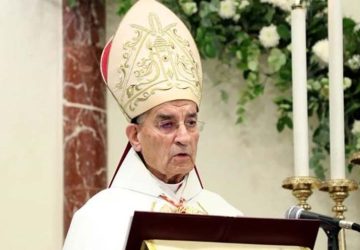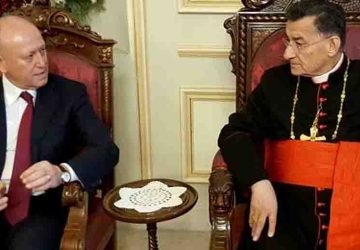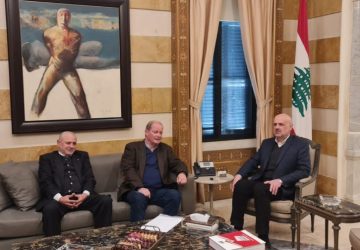Listen to the article
The meeting between the Maronite Patriarch, Cardinal Bechara Rai, and French President Emmanuel Macron is crucial. The French invitation comes at a critical moment for both parties, as regional alliances undergo radical change in the Middle East, and Europe is compelled to lend added attention to the Ukrainian war. The timing of the visit falls in the context of a worrisome vacancy in the Lebanese presidency amidst acute political divisions, while the state is collapsing both economically and structurally. Consequently, it was only natural for the Maronite patriarch to express the following concerns: to restore the trust between the patriarchate and France, and to regain French benefits allocated to educational and medical institutions. These benefits were exclusively reserved for the Maronite community, as being a political and cultural ally, and not a religious one. This visit, similar to one from a national leader, and not a religious one, is also a historical moment as it follows in the footsteps of the late patriarchs Hoayek and Arida. As such, it involves an urgent meeting of the Council of Bishops to endorse the patriarch, perceived as the custodian of Greater Lebanon, considering the regional changes.
Political Concerns
Amidst regional and global transformations, the patriarchy has expressed political concerns regarding the future role and mission of Lebanon: whether it will be used as a battleground for settling scores, or viewed as a neutral oasis to foster dialogue. Any international marginalization of Lebanon will result in the loss of its future role. The meeting between the Maronite Patriarch and the French President is a good opportunity to reiterate the indelible principles embraced by Bkerkeh since its founding position, and its role as a patron of the Greater Lebanon project: a sovereign and independent homeland for its citizens. This represents an unwavering position against any divisive or federalist agenda, aiming to preserve coexistence and living together.
Bkerkeh fears the scenario that would place Lebanon under a new tutelage that would require the presence of a compromising, subservient, non-conventional president, one who cannot rely on the trust of Christians and will not ensure the implementation of Security Council resolutions regarding Lebanon’s sovereignty and independence.
Presidential Concerns
It is only natural for the Maronite patriarchy to have concerns regarding France’s position regarding the Lebanese presidency, given the information that the French administration will prioritize its alliance with those in control of the arms and the oil, to the detriment of the historical and cultural alliance. The Elysée Palace has issues regarding the involvement of the Patriarch as being an internal political actor. As such, it is inadmissible for the Patriarch to become part of the last resort option: a president forced upon some, or a presidential vacuum!
The stance of the Maronite patriarchy on the matter is not tied to specific candidates, but rather to the profile, program, and sovereign values of the presidential candidate. The position of the patriarchy is in line with the following belief: France, in conjunction with influential powers, should neither ensure the dominance of one faction over another, nor endorse the appointment of a president who embodies a vision that opposes the principles of sovereignty and of the national pact.
It is crucial to call upon the French President to push for a national dialogue among all Lebanese factions, without any exception, under the auspices of the five states which convened in Paris earlier this year to discuss Lebanon, aiming to facilitate the election of a president. The revival of French-Maronite relations requires ensuring that the decision-making power of the Maronites is not usurped, not solely as a religious community, but as a founding Lebanese component.
Existential Concerns
European policies regarding the crisis in Syria have failed to reflect on the Lebanese identity. The Patriarch can only raise the issue of the Syrian refugees and immigrants in Lebanon. A problem that has led to a demographic imbalance, and to the creation of a new social contract that contradicts the Taif Agreement, and is based on weakening the role of emerging minorities. The repercussions of this existential crisis are causing the collapse of Lebanon, draining the country of its strength, and altering its identity. It is important to recall that the Maronite patriarchate sacrificed the executive powers of the Maronite President of the Republic through the Taif Agreement to ensure civil peace. This position was neither a capitulation nor a recognition that Christians had lost the war. Instead, the patriarchate elected not to forfeit Lebanon, at a time when the warlords had lost faith in the state.
Cultural Preoccupations
It is the duty of the French presidency to protect Lebanon’s cultural identity, of which the French-speaking community is a part. The future of Francophonie is at stake in Lebanon, especially as Catholic French-speaking schools and universities are gradually shifting towards the American system. France must preserve Lebanese pluralism as a model for dialogue between civilizations, as a natural and authentic Levantine ground for Islamic-Christian dialogue. This is crucial, especially since French pluralism is shifting towards fanaticism and riots, leading to a significant decline in the influence of French culture in the Arab Orient.
Recent political experiences have shown that Paris’ alliances with non-Christians Lebanese have been unsuccessful, as they were based on either commercial interests, or political motives. The Elysée cannot deny Bkerkeh’s legacy in Paris. Therefore, France remains in Lebanese mindfulness as the “affectionate and compassionate mother”, as well as the greatest friendly country. Everyone needs to remember President Macron’s two visits to Lebanon following the port explosion, the causes of which remain unknown until today.
Religious Concerns
There is no discrepancy between the Maronite patriarchy’s project and the French secular state’s. The Maronite Church was the first to officially suggest the idea of a civil state through the Maronite Patriarchal Synod. A conflict does exist between the values of the French state and its new allies in Paris, whose project is based on a religious state and the logic of demographic numbers.
The Maronite project in Lebanon remains the project of a civil state governed by dialogue, a democratic state that respects the rights of all without discrimination, one that fosters societal values, and is founded on the principles of sovereignty and coexistence. However, the Maronite vision of Lebanon has never envisioned a homeland without Muslims. Furthermore, the Vatican’s constants concerning the Arab world are expressed in both Apostolic Exhortations, and through the Document on Human Fraternity, which are based on the principle of Islamic-Christian dialogue for the well-being of humanity and its dignity.
The lesson that France ought to learn from Lebanon is to protect religious rituals and respect religious pluralism before sectarianism destroys the fabric of French society.
* Antonios Abou Kasm is an international lawyer and professor of international law





